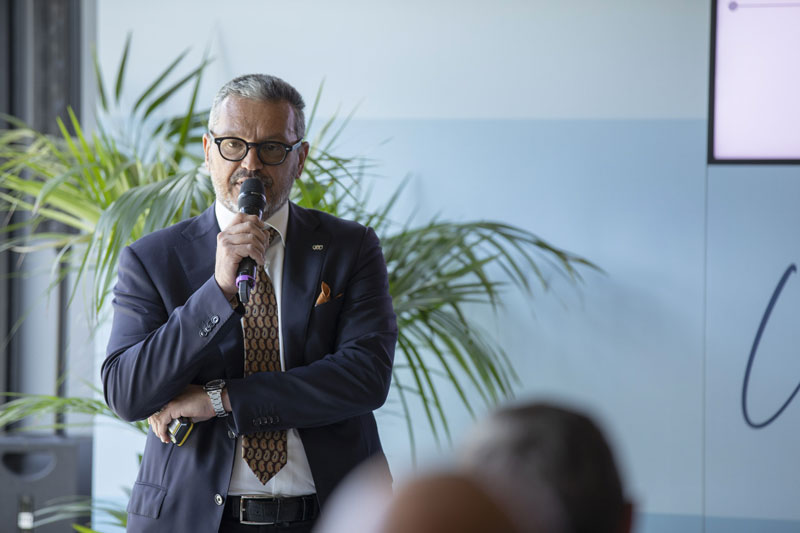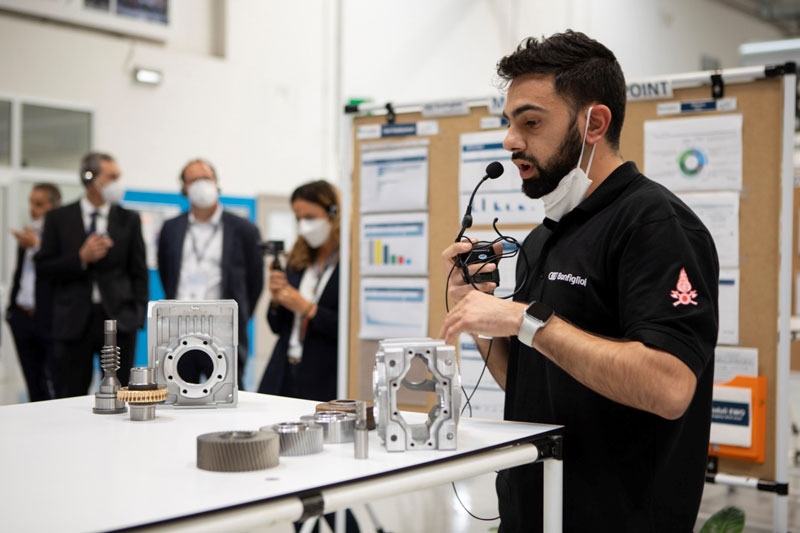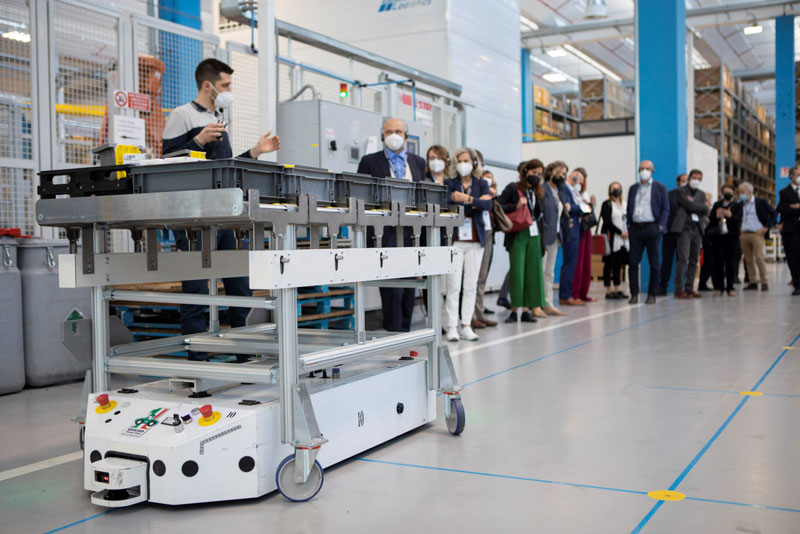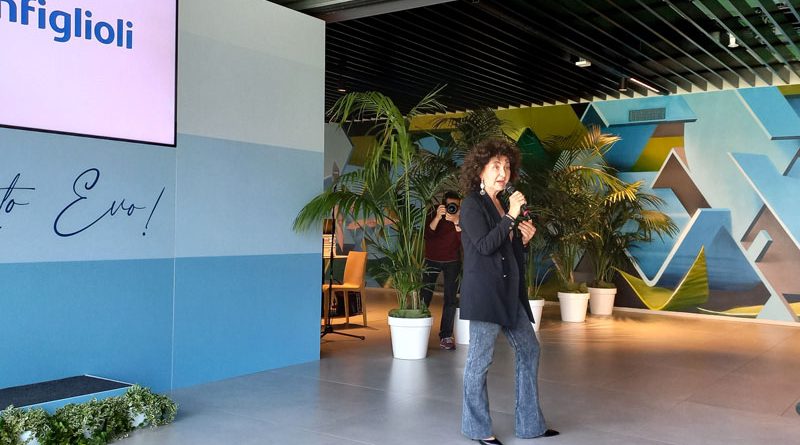Industry 4.0 lives here
The EVO Plant in Calderara di Reno is a concrete example of Bonfiglioli’s vision of Industry 4.0: to better meet customer needs through digitisation, an enabling technology for the change imposed by the new global scenarios. The new plant has been built following an innovative concept which focuses on sustainability and “green” technologies. Here, solutions for power transmission and control are developed and produced, aimed especially at machinery, the process industry and robotics.
by Silvia Crespi
“What you see is a historic factory, founded by my father, Cavaliere del Lavoro Clementino Bonfiglioli, in 1964”. With these words Sonia Bonfiglioli, President of the Bonfiglioli Group, welcomed the trade press last April. Today in Calderara di Reno stands Plant Evo, a state-of-the-art factory. The President also calls it a ‘pilot’ plant, since it was built according to innovative principles, with a focus on sustainability and ‘green’ and digital technologies.
The first objective? To prepare employees to interface with digital technologies, with a new production scenario. “In this respect,” Sonia Bonfiglioli stated, “a massive training project has been put in place. The digital platform ‘Bonfiglioli Academy’ involves the entire staff.” In 2021, 17,500 hours of training aimed at both blue-collar (over 7,000) and white-collar workers (16,000) have been provided.



Two years of challenges for Bonfiglioli
Fausto Carboni, the Group’ s CEO, took the floor immediately after the President, reviewing the two years of challenges which have put to the test the global industry, as well as our everyday life. “‘These last two years have changed the world,” Carboni said. “Our priority was to maintain safety, of the operators first and then of our business. The pandemic and the subsequent lockdown caused a whole series of problems which we are well aware of. From the scarcity or unavailability of raw materials and supplies, to the energy crisis, the rising prices of natural gas and electricity… and now the war in Ukraine. These challenges have generated new scenarios, forcing us to develop new capabilities”.
And the new capabilities have paid off. In 2021, Bonfiglioli surpassed the milestone of €1 billion in sales thanks to a 16% increase in sales over the previous year. This historic result was achieved after a slowdown in 2020 due to the impact of the pandemic. The construction, agriculture, materials handling and most industrial machinery sectors were hit hard by the 2020 crisis, negatively impacting Bonfiglioli’s revenues. In contrast, the wind turbine sector boomed in 2020, thanks mainly to incentives from the Chinese and US governments. Overall, Bonfiglioli’s sales in the wind turbine sector grew by more than 20% in 2020.
In 2021, Bonfiglioli’s strong upswing in turnover in the construction, agriculture, material handling sectors and in many industrial machinery businesses led to an unprecedented result.
Carboni summarised Bonfiglioli’s strategic priorities, starting with reshoring: ‘We need to move from global to continental supply chains. The use of green energy is not an abstract concept; we must move from words to deeds. Reducing consumption and recycling have also become a must… doing more with less, that is the motto. Factory automation and electrification are other goals to pursue… and digitisation is the key to all this, the technology which enables change”.
The new EVO plant, a concrete example of a new production concept
The EVO plant we visited, where work started in 2019, is a concrete example of ‘alignment’ with the new scenarios described above. In the plant, digitisation is implemented at all levels: from process to product to servitisation. The level of automation is very high and there are many robotic cells which we have seen in action. We can say that Industry 4.0 concepts are applied transversally here, at every stage of the manufacturing process. It is important to mention, in this regard, the acquisition of the shares of Sampingranaggi (Italy) and Samp Machinery Shanghai (China), which, at the same time as new developments in the field of mobile robotics (BlueRoll) and new AC drives (AxiaVert and DGM) are expanding Bonfiglioli’s range of action in the field of industrial automation.
“The new plant,” Massimo Birolo, Manufacturing Operations Director, who accompanied us on our guided tour of Plant EVO, said, “is not just a new plant, but a new business model which focuses on people, trained not only with new skills, but with a new mentality. All Bonfiglioli plants share the same methodologies and layout.”.
Sustainability: another pivotal aspect of the strategy
As previously mentioned, sustainability is another strength of the strategy implemented by Bonfiglioli, an increasingly green company. Social and ecological responsibility has always been part of the company’s DNA and in 2020, in its first sustainability report, it declared its intentions for a sustainable future. Buildings with (almost) zero consumption and a minimal ecological footprint, the development of highly efficient solutions for customers, the digitisation of processes and initiatives to support local communities ( young people, land development, technical and STEM education) represent Bonfiglioli’s commitment to a better future.
Three business units focused on specific sectors
In 2021, a company reorganisation led to focusing the three Business Units (Discrete Manufacturing and Process Industries, Motion & Robotics and Mobility & Wind Industries) on specific sectors, with the aim of satisfying customer needs in the best and most effective way, thus raising the level of customer satisfaction.
The BU Discrete Manufacturing and Process Industries is located in the EVO plant.
The Motion & Robotics BU is the evolution of the previous Mechatronics & Motion Systems BU, implemented after the aforementioned acquisition of SAMPINGRANAGGI. It will allow Bonfiglioli to play an increasingly important role in the world of motion and robotics. It is mainly aimed at the textile, material handling, packaging and robotics sectors. ” This is the division,” Marco Cani, Managing Director, explained, “where we find the highest levels of precision, efficiency and optimisation of energy consumption to produce mechatronic solutions for industrial automation”.
The BU Discrete Manufacturing & Process Industries is able to meet a wide range of applications in the fields of logistics and storage systems (cranes, hoists, etc.), food & beverage plants, recycling plants, biogas production and other sustainable energy sources.
The Forlì plant hosts the Mobility & Wind Industry Division
The second day of work was dedicated to a visit to the Forlì plant hosting the Mobility & Wind Industries Division. The Division recorded an increase in turnover in 2021 compared to 2020 thanks to the booming wind industry and the performance of the mobile machinery sector, including construction and road construction machinery.
In the field of drives for pitch and yaw control of wind turbines, Bonfiglioli has a long-standing know-how. Development work has already led to the third generation of increasingly efficient and functional AC drives, with the progressive reduction of both raw material consumption and machining. Besides, Bonfiglioli’s scalable IoT platform makes it possible to increase generator productivity, thanks to Condition Monitoring, Health Status Check, that is, component health check, and predictive maintenance.
There has also been significant growth in the mobile machinery segment, a sector which is going through an important transition period, with the migration from traditional motorisation to electric motorisation.
It is estimated that, by 2030, 48% of mobile machines sold will be fitted with electric or hybrid transmissions. Bonfiglioli is already at the forefront of this challenge. Bonfiglioli Ennowing, the new entity born from the expansion of the electromobility competence centre, deals precisely with offering integrated electric transmissions for both on-highway and off-highway vehicles.
The Forlì plant has been expanded by 10,000 m2 precisely to meet the demand for e-mobility solutions.

